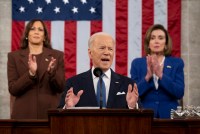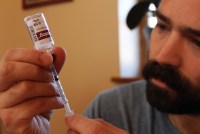Latest KFF Health News Stories
Covid’s ‘Silver Lining’: Research Breakthroughs for Chronic Disease, Cancer, and the Common Flu
Billions of dollars invested in mRNA vaccines and covid research could yield health care dividends for decades to come.
Readers and Tweeters Remain Vigilant on Masking and Billing
KHN gives readers a chance to comment on a recent batch of stories.
‘An Arm and a Leg’: Need an Expensive Drug? Here’s What You Need to Know
Even a personal finance expert can get stuck with a huge unexpected bill for a drug. Listen up for what you need to know about “copay accumulators.”
Which Companies Aren’t Exiting Russia? Big Pharma
U.S. and global drug manufacturers invested in Russia’s sizable pharmaceutical industry contend international humanitarian law requires they continue manufacturing and selling their products there, even while condemning the Ukraine invasion. Not everyone agrees.
Patients Divided Over Alzheimer’s Drug: Is It a ‘Risk I’m Willing to Take’ or Just a ‘Magic Pill’?
Medicare has proposed limiting coverage of Aduhelm, the costly new drug to treat Alzheimer’s disease, and several prominent groups representing patients and their families are pressing the program to make it more widely available. But among individuals facing the disease, the outlook is more nuanced.
$35 Insulin Cap Is Welcome, Popular, and Bipartisan. But Congress May Not Pass It Anyway.
Spun off from the ailing but not-quite-dead Build Back Better legislation, a popular proposal to cap out-of-pocket insulin costs at $35 a month faces tough political realities that could kill it.
California Governor’s Big Promises on Drug Prices Are Slow to Materialize
Gov. Gavin Newsom has launched several initiatives to cut rising drug prices, but the savings haven’t been as monumental as he promised. And his plan to have California make its own generic drugs hasn’t gotten off the ground.
La medicación para prevenir el VIH debe ser gratis, pero las aseguradoras siguen cobrándola
Una norma federal estableció que los pacientes no debían pagar por la medicación para prevenir el VIH. Pero las aseguradoras siguen enviando facturas por los fármacos y servicios médicos asociados.
HIV Preventive Care Is Supposed to Be Free in the US. So, Why Are Some Patients Still Paying?
The Department of Labor issued rules in July clarifying that health plans need to cover the costs of prescription drugs proven to prevent HIV infection, along with related lab tests and medical appointments, at no cost to patients. More than half a year later, the erroneous billing continues.
Fact Check: Biden Sets High Bar in 1st State of the Union Speech
What a difference a year makes. The speech was delivered to a largely unmasked crowd of lawmakers, justices, and Cabinet members in the House chamber.
Journalists Review Hospital Penalties and Problems Riddling Medicaid Rx Program
KHN and California Healthline staff made the rounds on national and local media this week to discuss their stories. Here’s a collection of their appearances.
KHN’s ‘What the Health?’: It’s Health Costs, Stupid (2022 Edition)
As the pandemic wanes, for now, the ever-rising cost of health care is again taking center stage. Meanwhile, a year into the Biden administration, the FDA finally has a Senate-confirmed commissioner, Dr. Robert Califf. Tami Luhby of CNN, Sarah Karlin-Smith of the Pink Sheet, and Rachel Cohrs of Stat join KHN’s Julie Rovner to discuss these issues and more. Also this week, Rovner interviews Hannah Wesolowski of the National Alliance on Mental Illness, about how the pandemic has worsened the nation’s mental health crisis and what can be done about it.
Inside the Tactical Tug of War Over the Controversial Alzheimer’s Drug
An epic battle is playing out behind the scenes over whether the government should pay for Aduhelm, an FDA-approved Alzheimer’s drug that scientists say has not been proven to work.
Journalists Discuss Cracks in the Health Care System and Roadblocks to Covid Booster Shots
KHN and California Healthline staff made the rounds on national and local media this week to discuss their stories. Here’s a collection of their appearances.
Muchas farmacias no saben que los CDC han autorizado la cuarta dosis de la vacuna contra covid para personas con sistemas inmunes comprometidos.
I Write About America’s Absurd Health Care System. Then I Got Caught Up in It.
A KHN reporter had written for years about the people left behind by the absurdly complex and expensive U.S. health care system. Then he found himself navigating that maze as he tried to get his insulin prescription filled.
Pharmacies Are Turning Away Immunocompromised Patients Seeking 4th Covid Shot
The Centers for Disease Control and Prevention quietly changed its guidance to allow an extra shot in certain cases, but some pharmacy personnel are confused about who is eligible.
Patient, Beware: Some States Still Pushing Ineffective Covid Antibody Treatments
The top 12 states using antibody therapies produced by Regeneron and Lilly — which research shows don’t work against the omicron variant — include several Southern states with some of the nation’s lowest vaccination rates, but also California, which ranks among the top 20 for fully vaccinated residents.
As Omicron Surges, Effort to Vaccinate Young Children Stalls
Just 18% of 5- to 11-year-olds are fully vaccinated, with rates varying significantly across the country, a KHN analysis of federal data shows. Pediatricians say the slow pace and geographic disparities are alarming, especially against the backdrop of record numbers of cases and pediatric hospitalizations.
KHN’s ‘What the Health?’: Dealing With Drug Prices
Medicare officials tentatively plan to restrict the use of a controversial Alzheimer’s drug to only those patients participating in clinical trials, while the Department of Health and Human Services looks into lowering the monthly Medicare Part B premium. Meanwhile, covid confusion still reigns, as the Biden administration moves, belatedly, to make more masks and tests available. Joanne Kenen of Politico and the Johns Hopkins Bloomberg School of Public Health, Sarah Karlin-Smith of the Pink Sheet and Rachel Cohrs of Stat join KHN’s Julie Rovner to discuss these issues and more.























